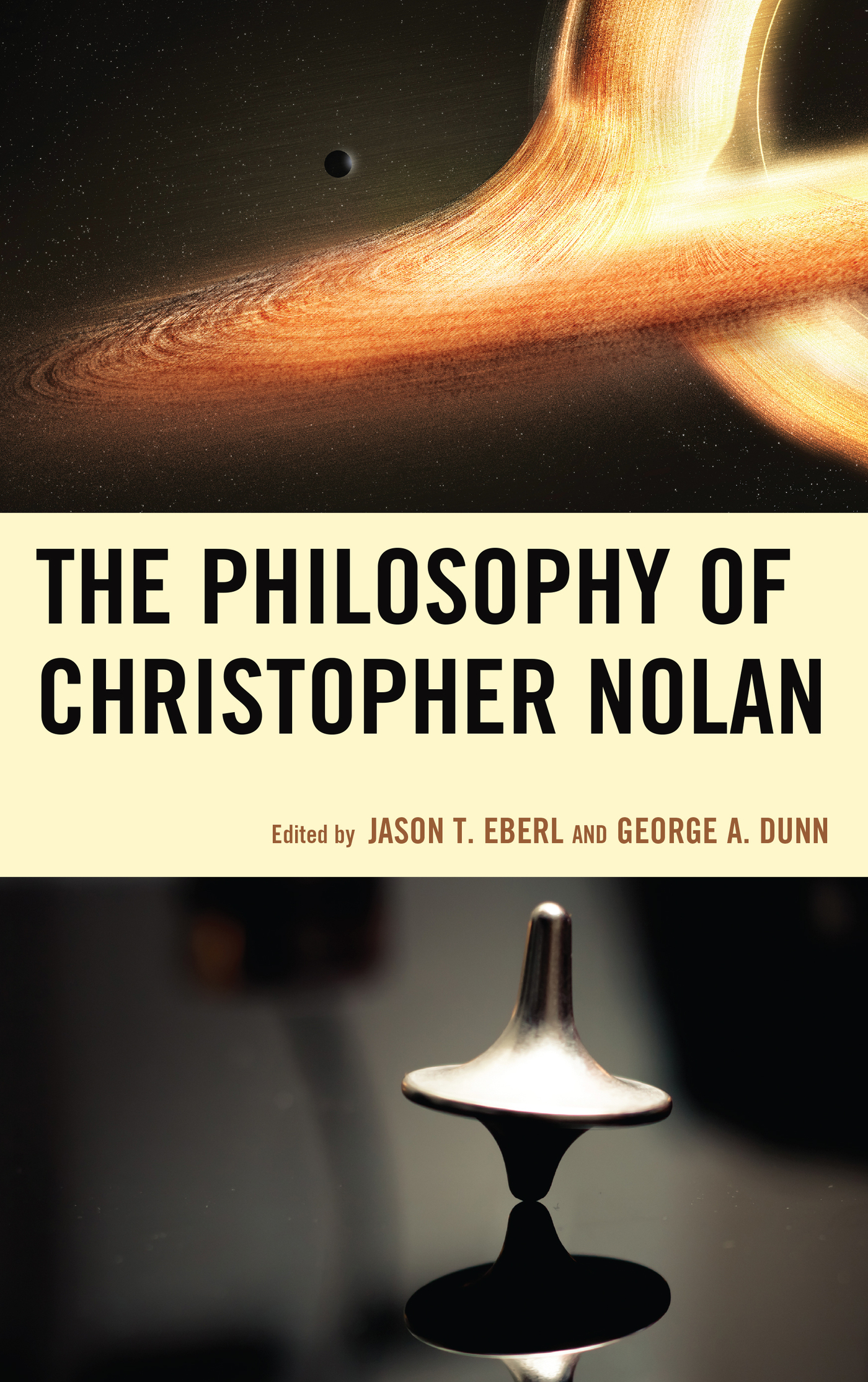The Philosophy of
Christopher Nolan
The Philosophy of Popular Culture
Series Editor: Mark T. Conard, Marymount Manhattan College
The Philosophy of Popular Culture series comprises volumes that explore the intersection of philosophy and popular culture. The works are devoted to a subject in popular culture, such as a particular genre, filmmaker, or television show. The essays investigate the philosophical underpinnings, or do a philosophical analysis, of the particular topic. The books will contain smart, jargon-free essays that illuminate texts (films and TV shows) in popular culture, and they will introduce non-specialists to traditional philosophical ideas and issues. The governing ideas of the series are that texts in popular culture are worthy of philosophical analysis and that philosophical thinking and traditional philosophical concepts can enlighten us and enrich our everyday lives.
Titles in the Series
The Who and Philosophy, edited by Rocco J. Gennaro and Casey Harison
The Philosophy of Documentary Film: Image, Sound, Fiction, Truth, edited by David LaRocca
The Philosophy of Christopher Nolan, edited by Jason T. Eberl and George A. Dunn
The Philosophy of
Christopher Nolan
Edited by
Jason T. Eberl and George A. Dunn
LEXINGTON BOOKS
Lanham Boulder New York London
Published by Lexington Books
An imprint of The Rowman & Littlefield Publishing Group, Inc.
4501 Forbes Boulevard, Suite 200, Lanham, Maryland 20706
www.rowman.com
Unit A, Whitacre Mews, 26-34 Stannary Street, London SE11 4AB
Copyright 2017 by Lexington Books
Quotations from the film The Prestige used with permission from Disney Enterprises, Inc.
All rights reserved. No part of this book may be reproduced in any form or by any electronic or mechanical means, including information storage and retrieval systems, without written permission from the publisher, except by a reviewer who may quote passages in a review.
British Library Cataloguing in Publication Information Available
Library of Congress Cataloging-in-Publication Data Available
ISBN 978-1-4985-1352-4 (cloth : alkaline paper)
ISBN 978-1-4985-1353-1 (electronic)
 TM The paper used in this publication meets the minimum requirements of American National Standard for Information Sciences Permanence of Paper for Printed Library Materials, ANSI/NISO Z39.48-1992.
TM The paper used in this publication meets the minimum requirements of American National Standard for Information Sciences Permanence of Paper for Printed Library Materials, ANSI/NISO Z39.48-1992.
Printed in the United States of America
Introduction
Christopher Nolan is a cinematic auteur, as a director, a writer, and a producer. He is not, however, a philosopher in the technical sense of the term that denotes professionals working in the academic discipline. Nevertheless, a volume entitled The Philosophy of Christopher Nolan is perfectly appropriate as his filmsspanning nearly twenty years from Doodlebug (1997) through Interstellar (2014) and beyondhave provoked philosophical reflection among viewers whove found his films, to quote comedian John Oliver, more than a little vague. In this respect, Nolan is not all that different from the father of Western philosophy, Socrates (d. 399 BCE), who styled himself a sort of gadfly whose function was to sting his fellow Athenians out of their intellectual complacency to ponder moral and other philosophical questions about which theyve often taken for granted simple, patent conclusions. There are no simple solutions for complex problems.
Lets consider Nolans oeuvre chronologically. First, in Doodlebug, he challenges a hallmark of Western philosophy from Thomas Aquinas in the thirteenth century through Immanuel Kant in the eighteenth century that self-destruction is a fundamentally irrational desire. Although the protagonist in Doodlebug may indeed be irrational for wanting to squash himself, its not altogether clear that he might not have some reason for doing so; or, at the very least, his perhaps irrational action might bespeak a fundamental flaw of the human condition insofar as many of us willingly engage in potentially self-destructive behaviors. Doodlebug, for better or worse, may be the most Freudian of Nolans films as subconscious motivations lead one to self-destructive behavior; but the larger existential question of whether we have such motivations, and whether the behavior they induce may be rational at times, unavoidably challenges viewers presumptions through Nolans provocative imagery.
Following (1998) is Nolans first feature-length film and extends the thesis of Doodlebug to the level of a man who unwittingly participates in his own downfall. The narrative has expanded, however, to show the audience a bit more of what motivates the pre-fallen protagonist. Primarily, whats at issue is a need to belong, to be involved in others lives as a way of affirming the validity of ones own existence. Whether Nolan had ever read Martin Buber (18781965) or not, its clear that he shares Bubers fundamental thesis that I exist fully only with respect to a Thou who acknowledges my existence as such and vice versa. Theres an inherent danger in such co-dependency as it may devolve into a perverse master/slave dialectic; although, even in such a relationship, according to Georg Wilhelm Friedrich Hegel (17701831), the master is just as dependent on the slave as the reverse. In the case of Cobb and The Young Man, however, the former functions as a master manipulator who doesnt have any need of the latter and can easily disappear into the crowd as if he never existed. All of which raises the question of whether Cobb ever really existed; perhaps The Young Man is truly an extension of the self-destructive protagonist in Doodlebug.
Self-identity persists as a central organizing theme in Nolans next and more widely-distributed film, Memento (2000). Here, Nolan completely disrupts the protagonist Leonard Shelbys sense of identity and creates a situation in which he must create meaning for his existenceotherwise, why not squash himself as in Doodlebug. Leonards need to affirm his self-identity, though, comes at the cost of sacrificing others identityparticularly that of Teddy or any other putative John G. who happens to cross his path. Ironically, though, by eliminating Teddy, Leonard has inadvertently created the conditions of his own existential demise, since the narrative Teddy had helped Leonard construct is what gave meaning to his existence. Without the telosto use the classical Greek termof finding and killing John G., theres no further purpose to Leonards existence to guide his moral choices. By killing the only John G. to whom the facts hes tattooed on his body have led him, Leonard has only succeeded in squashing his own identity and sense of purpose.
Insomnia (2002) pushes further this question of ones moral telos by forcing its protagonist, Will Dormer, to question his motivations in killing his partner, who was on the verge of exposing his duplicitousness. Eschewing the pat ethical questions of whether Dormer was justified or not in the decisions he made, Nolan is more interested in the moral psychology of a person who must learn how to live with the decisions hes madegood or bad. Is Dormer so different from the murderer Walter Finch? Is Dormers death actually a release for him from his own moral compromises? Having squashed himself morally, and in the process ruined his reputation as a police detective whos imprisoned dozens of criminals who may now go free, physical death becomes not so much a punishment for Dormer but an escape.

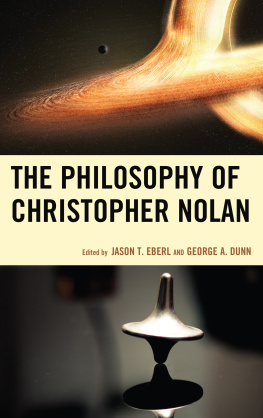
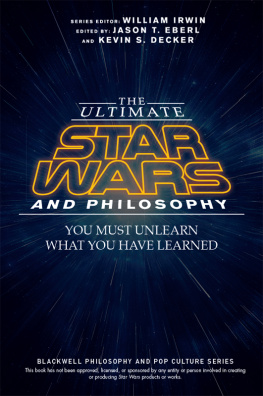

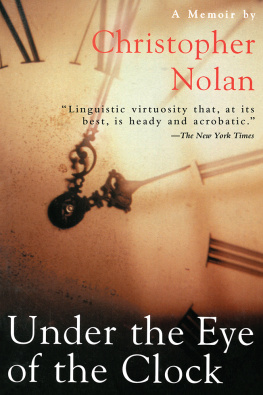
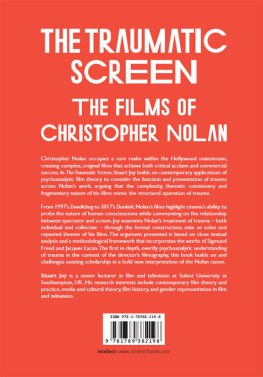
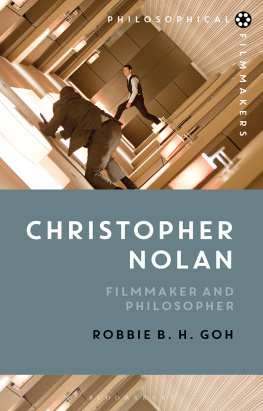
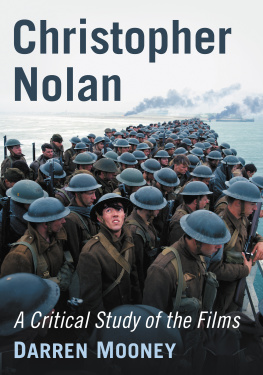
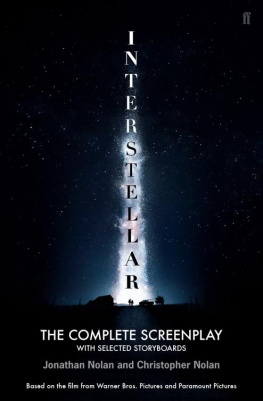
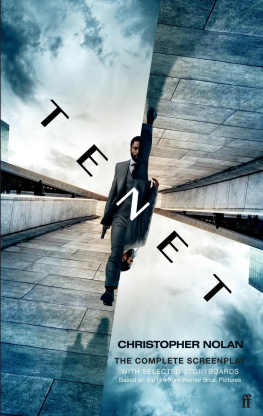


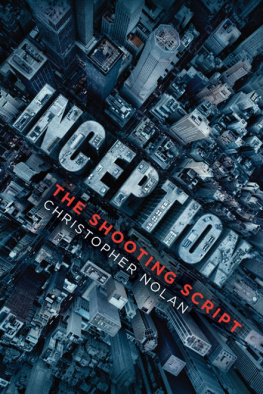
 TM The paper used in this publication meets the minimum requirements of American National Standard for Information Sciences Permanence of Paper for Printed Library Materials, ANSI/NISO Z39.48-1992.
TM The paper used in this publication meets the minimum requirements of American National Standard for Information Sciences Permanence of Paper for Printed Library Materials, ANSI/NISO Z39.48-1992.